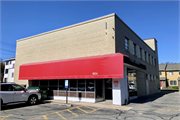Property Record
1024 Regent Street
Architecture and History Inventory
| Historic Name: | WYOU Studio |
|---|---|
| Other Name: | |
| Contributing: | |
| Reference Number: | 241100 |
| Location (Address): | 1024 Regent Street |
|---|---|
| County: | Dane |
| City: | Madison |
| Township/Village: | |
| Unincorporated Community: | |
| Town: | |
| Range: | |
| Direction: | |
| Section: | |
| Quarter Section: | |
| Quarter/Quarter Section: |
| Year Built: | 1956 |
|---|---|
| Additions: | |
| Survey Date: | 2019 |
| Historic Use: | small office building |
| Architectural Style: | Contemporary |
| Structural System: | |
| Wall Material: | Brick |
| Architect: | |
| Other Buildings On Site: | |
| Demolished?: | No |
| Demolished Date: |
| National/State Register Listing Name: | Not listed |
|---|---|
| National Register Listing Date: | |
| State Register Listing Date: |
| Additional Information: | City of Madison, Wisconsin Underrepresented Communities Historic Resource Survey Report: Local public access television station Community Access Center (CAC) became a supportive broadcast outlet for self-produced content from the LGBTQ community when it began transmitting in 1974 or 1975. CAC negotiated with the Complete Channel Television (CCT), Madison’s only cable provider at the time, for studio space and funding. As a nonprofit television station, CAC was available to anyone who could produce a regular program on any subject. This policy made CAC broadcasting available to those who could not access mainstream media outlets, like LGBTQ organizations. WYOU provided access to a broader audience well beyond what LGBTQ organizations could reach with self-published newsletters. In 1979, The United, a political advocacy group, took advantage of the opportunity and started producing Glad to be Gay on CAC with assistance from volunteers Michael Henry and David Runyon. It was one of only a handful of LGBTQ television shows in the country at the time. In 1981, David Runyon left the show to start the weekly, hour-long Nothing to Hide which focused on local and national LGBTQ events and issues. When the Wisconsin Gay Rights Bill which was the first in the country to prohibit discrimination in employment, housing, and public accommodations on the basis of sexual orientation was signed into law in February of 1982, the program broadcast Wisconsin Governor Dreyfus’s statement and signing. Another program broadcast the signing of the Consenting Adults Bill in May of 1983 that decriminalized cohabitation, fornication (sex outside of marriage), and homosexual behavior between consenting adults in Wisconsin. The program documented civil rights marches held in Madison in 1989, 1991, and 1996 as well as Washington, D.C. in 1979, 1987, and 1993. Guests included locally, nationally, and internationally known activists, politicians, and writers such as Tammy Baldwin, Angela Davis, Toni Morrison, George Mosse, Eve Kosofsky Sedgwick, Dick Wagner, and Howard Zinn. Nothing to Hide ran for a remarkable 20 years on CAC, and later WYOU, until David Runyon died in 2001. It was one of the longest-running LGBTQ television programs in history. Archives of the show are held at the University of Wisconsin-Madison Archives. CAC closed due to a lack of funding in 1983. The channel was reorganized the following year as channel WYOU run by WYOU Community Television, Inc. which continues to operate to this day. The television channels CAC and WYOU, and specifically the programs Glad to be Gay (1979-1981) and Nothing to Hide (1981-2001) are locally significant in the LGBTQ community in the area of Commerce, particularly Information Services, from 1979 to 2001. During this period, there were numerous resources associated with them: 1024 Regent Street from 1978 to 1984, a non-extant building at 20 N. Orchard Street from 1984 to 1985, the Video Center, Inc. at 2822 Index Road in Fitchburg from 1985 to 1987, 1325 Greenway Cross from 1987 to 1990, 1619 Monroe Street from 1990 to 1997, and Madison Gas and Electric at 650 East Main Street from 1997 to 2001. The primary resource associated with CAC, WYOU, Glad to be Gay, and Nothing to Hide and their significance in Commerce are 1024 Regent Street. |
|---|---|
| Bibliographic References: |
| Wisconsin Architecture and History Inventory, State Historic Preservation Office, Wisconsin Historical Society, Madison, Wisconsin |

